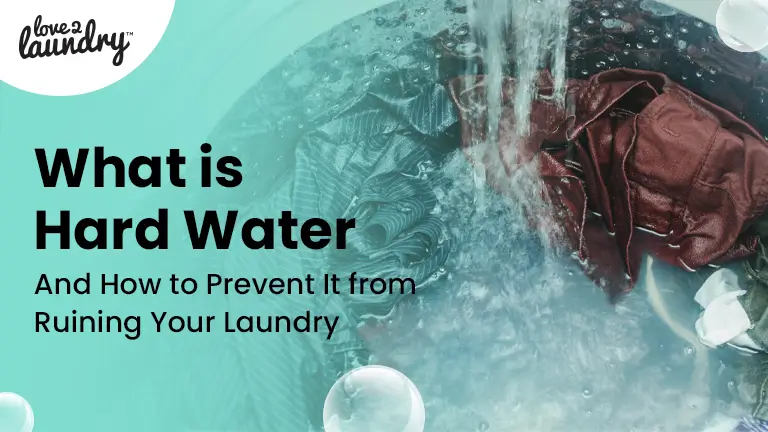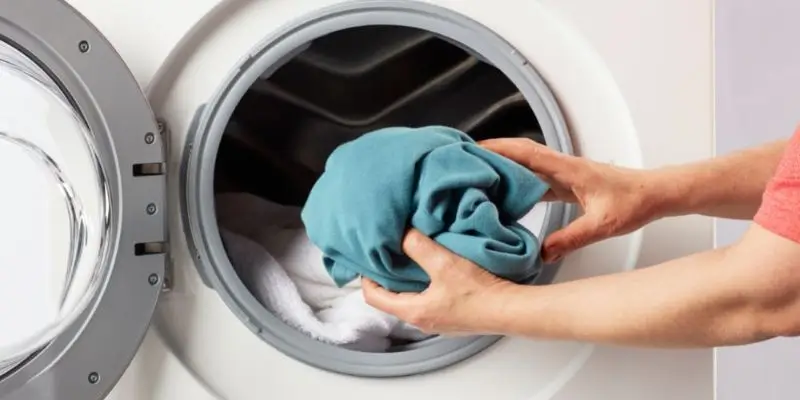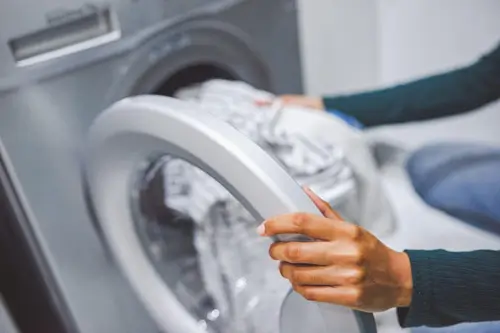What is Hard Water and How to Prevent It from Ruining Your Laundry

Everyone wants their clothes to feel fresh and soft when they are pulled out of the laundry. Sometimes, the reality becomes a frustrating cycle of stiff towels, faded colors, and a persistent, dingy feel. The culprit might not be your detergent or your washing machine, but something far more fundamental: your water.
Therefore, understanding what is hard water is crucial for your laundry. This water contains a high concentration of dissolved minerals, primarily calcium and magnesium. While these minerals are harmless to drink, they can harm your laundry, preventing soap from lathering effectively and leaving behind a sticky, invisible residue.
This mineral buildup is the reason your once-plush towels now feel scratchy and your dark jeans have developed a chalky, greyish tinge. The minerals cling to fabric fibers, weighing them down and reducing their lifespan. This guide aims to provide a comprehensive overview of the problem and offer practical solutions.
Understanding Hard Water
In simple terms, hard water is defined as having a high concentration of dissolved minerals, primarily calcium and magnesium. When water passes through rocks, soil, or subsurface deposits, these minerals are dissolved and end up in the water.
Water gets “harder” when it absorbs more minerals. Unlike soft water, hard water struggles to mix well with soap or detergent. This leads to residue, soap scum, and less efficient cleaning.
Although it is safe to consume, it may cause problems with plumbing, appliances, and laundry. Mineral accumulation over time can cause clothing to become rigid and lifeless. Therefore, understanding how water gets “hard” aids in selecting the best laundry solutions.

Causes of Hard Water
Hard water forms when rainwater or water stream passes through areas rich in limestone, chalk, or gypsum. These rocks release calcium and magnesium ions into the water. The longer water stays underground, the higher its mineral content becomes.
How Hard Water is Measured
Hardness is measured by the concentration of minerals, usually in parts per million (ppm) or grains per gallon (gpg). A higher number indicates harder water, which makes cleaning more difficult. Water testing kits or municipal reports are the easiest ways to check hardness levels.
Effects of Hard Water on Clothes
It is crucial to understand what is hard water and its content. It can cause a range of noticeable issues that go beyond just hindering cleanliness.
These hard water laundry issues directly impact the quality, feel, and even the lifespan of your clothing.
Here are some of the common effects of using hard water:
Why Hard Water Ruins Laundry Quality
- Many wonder what is hard water; it’s water with excess minerals.
- These minerals cling to fabric, reducing the detergent’s power.
- Clothes become stiff instead of soft and fresh.
- Colors fade faster, making laundry look older.
- Residue builds up, dulling bright whites and prints.
- Fibers weaken, causing clothes to wear out quickly.
- Laundry may need re-washing.
- Hacks to freshen clothes without washing may not work.
- Knowing what is hard water helps protect laundry quality.
Signs Your Laundry is Affected by Hard Water
- Still asking what is hard water? You’ll notice stiff clothing.
- White items turn grayish or yellow.
- Dark shades lose vibrancy after a few washes.
- Towels feel rough and less absorbent.
- Soap residue remains on freshly washed fabrics.
- Fabrics appear dingy even after cleaning.
- These issues all signal your laundry is battling hard water.
Pro Tip: Selecting the proper drying method also helps preserve fabric quality. Check this guide on line dry vs. tumble dry for smarter laundry care.
Laundry Solutions for Hard Water
Here are some of the helpful solutions for hard water:
Tips for Washing Clothes in Hard Water
When using hard water for laundry, adjusting your routine can protect your clothes. Try adding a water softener to each wash cycle to neutralize minerals. Pre-soak heavily soiled garments with a mix of detergent and baking soda for better cleaning. Use warmer water settings, as heat helps break down mineral buildup more effectively.
Always measure detergent carefully; using too much can cause it to react with minerals and leave an excessive residue. Lastly, combine these steps with smart laundry practices to save water and energy so your clothes stay fresh without wasting resources.
Bonus Read: Along with tackling hard water, you can also learn how to stop clothes from shrinking to keep your wardrobe looking new.
Choosing the Best Laundry Detergent for Hard Water
Regular detergents struggle in mineral-heavy water, leaving residue on clothes. Opt for liquid or specially formulated detergents that are designed to work effectively in hard water. These detergents cut through buildup and support long-lasting laundry care.
Taking Vinegar Help with Hard Water Laundry
Many ask, does vinegar help with hard water laundry, and the answer is yes. Vinegar acts as a natural softener, breaking down minerals and leaving clothes fresher. It also helps restore brightness to dull whites and dark fabrics.
Using Borax for Hard Water Laundry
Adding borax for hard water laundry can boost detergent performance. Borax softens minerals, allowing soap to clean deeper into fabric fibers. It’s an affordable way to fight stiffness, dinginess, and residue.
Benefits of Using a Hard Water Softener for Laundry
Understanding what is hard water and how it affects laundry is crucial. A hard water softener for laundry provides a long-term solution to the challenges, offering significant benefits for your clothes and appliances. By removing the minerals that cause hardness, a water softener helps clothes last longer.
The absence of calcium and magnesium buildup prevents fabric fibers from becoming brittle and wearing out quickly, keeping them soft and vibrant. One of the key benefits of water softeners is the substantial savings on detergent. With soft water, detergents can lather more effectively, meaning you need to use significantly less product to achieve a superior clean.
Moreover, a water softener protects your washing machine by preventing limescale buildup on internal components, such as heating elements and pipes, which can extend the appliance’s lifespan and prevent costly repairs.
How Love2Laundry Helps with Hard Water Laundry Problems
Love2Laundry provides a professional solution to the common issue of hard water laundry problems, a frequent concern for residents in Pakistan. We understand the damaging effects of hard water on clothes, from stiff, rough fabrics to faded colors and residue buildup.
To counter this, our expert team utilizes advanced, commercial-grade soft water systems and fabric-friendly detergents that are specifically designed to be effective without harsh minerals. Our commitment to eco-friendly methods assures your clothes are not only clean but also treated with care.
By choosing our reliable laundry service in Lahore, you eliminate the need for complicated laundry solutions for hard water at home and enjoy spotless, clean, and fresh laundry delivered right to your doorstep.

FAQs – What is hard water
What is in hard water?
Understanding what is hard water is crucial for your laundry. It contains a high concentration of dissolved minerals, primarily calcium and magnesium ions. These minerals are picked up as water flows through deposits of limestone, chalk, or gypsum.
What happens when cloth is washed with hard water?
For those seeking tips for washing clothes in hard water, it is important to understand that the minerals can react with detergents to form a soap scum that leaves fabrics feeling rough. This residue can also cause colors to fade and eventually damage the fabric fibers.
How long does it take for hard water to damage appliances?
The time it takes for hard water to damage appliances varies, but mineral buildup can occur quickly. Limescale can begin to form on heating elements and within pipes within weeks, reducing efficiency and potentially leading to costly appliance breakdowns over time.
How to reverse damage from hard water?
When looking for the best laundry detergent for hard water, consider using a liquid detergent or one specifically formulated to combat mineral buildup. For existing damage, acidic solutions like white vinegar can be used to dissolve and remove mineral scale from appliances and surfaces.
Conclusion: Protecting Your Laundry from Hard Water
In conclusion, understanding what is hard water is the first step toward protecting your laundry. While there are numerous smart laundry tips for washing clothes in hard water, such as using specific detergents or additives, the constant battle against mineral buildup can be frustrating.
For a permanent solution to your hard water laundry woes, consider a professional service. Love2Laundry offers premium laundry and dry cleaning that make sure your clothes are cleaned using soft water, leaving them feeling smooth, silky, looking vibrant, and lasting longer.
With our convenient free pickup & delivery laundry services, you can say goodbye to hard water laundry problems for good.


